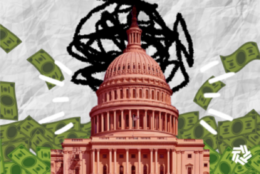Congress
-
The Homeland Security Department has created a task force to develop future workers. It will consider expanding DHS' involvement in cyber competitions and university programs, enhancing public-private partnerships and working with other agencies.
June 07, 2012 -
A congressional report released today outlines $70 billion of unspent federal dollars that could have helped disaster victims, spurred highway construction and fund education programs.
June 07, 2012 -
Are you a prepper? Are you stockpiling goods — beans, bullets, gold bars — to ride out a coming economic collapse, nuclear attack or natural disaster? Even if you aren't worried about those things, as a fed there are some things you should prepare for long before you retire, Senior Correspondent Mike Causey says.
June 07, 2012 -
NARFE president Joseph Beaudoin and Federal Times reporters Stephen Losey and Sean Reilly join host Mike Causey to talk about a wide variety of issues affecting federal workers. June 6, 2012
June 06, 2012 -
The White House has threatened to veto a House bill providing funding for the Homeland Security Department, taking issue with many of the bill's provisions, including a denial of a civilian pay raise. The committee bill also doesn't include any new funding for the agency's data-center consolidation efforts or construction for its new headquarters.
June 06, 2012 -
The State Department's share of overseas contingency contracting has grown over the last few years as the department took on new activities and functions as the military departed Iraq. Still, the budget shows, the Defense Department is the main player in overseas contingency contracting. And there's no guarantee Congress won't turn to the foreign affairs budget in its efforts to dramatically reduce the deficit.
June 05, 2012 -
How much do you know about Zen? For example when, if ever, is nothing better than something, or anything? Is it desirable to be the bullseye if your opposition is the gang that couldn't shoot straight, Senior Correspondent Mike Causey wonders.
June 05, 2012 -
A congressional investigation has revealed that $1.1 million in bonuses were awarded to 84 employees of the General Services Administration — while the inspector general was probing these individuals for wrongdoing or misconduct.
June 04, 2012 -
The House passed a veterans funding bill Thursday that includes extends the pay freeze another year for civilian employees of the the Defense and Veterans Affairs.
June 01, 2012 -
When you were little, you may have had an invisible friend, maybe a pet, a pretend brother or sister who loved you unconditionally or a superhero who defended you against bullies and monsters. Now that you are a grown-up federal worker you've graduated to new friends: invisible politicians.
May 31, 2012 -
The Food and Drug Administration would have more power to catch tainted pharmaceuticals manufactured overseas before they enter the U.S. market under legislation passed Wednesday by House lawmakers.
May 31, 2012 -
Defense Deputy Secretary Ashton Carter said for every dollar lawmakers add to the military's budget or for every program they continue that the Pentagon wants to cancel, it requires cuts elsewhere. He also called sequestration irrational and said DoD is not planning for it.
May 31, 2012 -
The Industry Botnet Group — coordinated by the White House Cybersecurity Office and the Departments of Commerce and Homeland Security — has posted nine principles, including coordination of cyber responsibilities across sectors and reporting lessons learned.
May 30, 2012 -
In an exclusive interview with Federal News Radio, White House Cyber Czar Howard Schmidt said a majority of the senior leaders in government understand the importance of securing agency, contractor and critical infrastructure systems. He said among his office's biggest accomplishments is moving the day-to-day cyber authority of federal civilian networks to DHS. Michael Daniel will replace Schmidt, whose last day is in early June.
May 30, 2012 -
The federal government now faces a fork in the road with regards to IT investment. George DelPrete, leader of Grant Thornton's federal government information technology, offers his insight. Rep. Gerry Connolly (D-Va.) talks about legislation he introduced to increase contracting opportunities for small businesses. Elijah Cummings (D-Md.) was one of the sponsors of a bill to help military families facing foreclosure.
May 25, 2012



